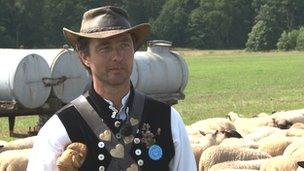Biofuel crops transform German farming
- Published
.jpg)
Pressure on the land has reduced pastures for Germany's sheep
The shepherds of Germany are worried. There are still about 2,000 of them tending sheep on grasslands, plying their ancient trade and defying time and the intrusions of modernity.
But it is a losing battle. The pastures they and the sheep need are diminishing. The shepherds blame biofuels. They complain that meadows where sheep have always grazed are being turned over to the growing of crops for power generation.
Maik Gersonder tends flocks in eastern Germany. It is getting harder to find suitable grassland because fields are being switched to grow maize (corn), which is processed into ethanol for cars.
"We have many problems with it," he told the BBC. "We have to go further to find land to graze the sheep. And it's pushed the price of land up."
The price of food on world markets is high at the moment - not quite as high as in 2008, but still very high compared with previous decades. In Germany, where one in eight acres of farmland is now used for biofuels, the price of wheat is at its highest in 25 years.
But the farmers who do the growing say that high prices are a recent thing, and that for too long food has been too cheap to grow profitably - so they have turned land over to plants for biofuel.
Fuel instead of food
Hellmuth Riestock has a big farm north of Berlin - but he is also now a generator of electricity. Alongside the cowshed are big green tanks into which chopped-up plants are put. They are mulched and processed to emit gas, which is then used for power generation. He uses some of the electricity, with the excess being sold to the grid.
.jpg)
Biofuel tanks in Germany: The shape of farming in future?
Last year, the price of his rye was so low it was not worth selling for food - so he turned it into electricity. This year, higher prices mean it will end up going into a mouth rather than a gas tank.
He thinks a system where it pays him to grow crops for fuel is not right. "It's a problem that food's been too cheap - so switching land to grow fuel made economic sense. And that's a relationship that needs to be addressed."
It is being addressed at the top of government - or rather argued over, because two of the important ministers take opposite views on the impact of biofuels.
The country's development minister, Dirk Niebel, said as he toured African countries recently: "We need to put corn on the plate, not in the tank."
But the environment minister, Peter Altmaier, disagreed. "There is no connection between the production of biofuel and food prices," he said, "not in Germany, anyway".
Crop research 'neglected'
Harald von Witzke, Professor of Agricultural Economics at Humboldt University in Berlin, told the BBC that only 3% of the world's farmland was being used for biofuel. This, he estimated, was responsible for perhaps one-tenth of the doubling in food prices since 2000.
"So for the time being the expansion of biofuel has had a limited effect on price increases."

Global food trends are putting the traditional shepherd's lifestyle at risk
There are other factors he thinks we should be worried about, like the decline in agricultural research.
"Agricultural research in the rich countries has been neglected. It has been cut back and this has resulted in a decline of annual productivity growth."
Broadly, food prices fell during the 20th Century. Science and technology delivered new methods, and productivity of people and land rose. That long-term fall is now set to be reversed, he thinks, raising the need for better yields.
But he says that in the European Union, "we've started to cut back agricultural research".
He says surpluses of food in the richer countries weakened the impulse to improve yields. On top of that, there was a vogue for research into climate change, rather than increasing crop production.
He warns that there are likely to be 10 billion people on this planet by 2050, compared with seven billion now. "The growth in demand will be close to a record pace because of continued very rapid population growth. The second reason is increasing incomes and consumption in the newly industrialising countries.
"Global demand is growing at a rapid pace. Agriculture faces increasing resource constraints. Land, water and energy are becoming scarcer and more expensive."
So, supply failing to keep pace with rising demand will push up food prices. It will also push up the price of farmland, whether to grow crops for food or fuel.
It is not new to grow fuel - that is what firewood is. But the drive towards biofuels is intensifying the pressure and sharpening the choices.
The shepherds of Germany live a quiet life - but under intense economic pressure.
- Published10 August 2012
- Published12 June 2012